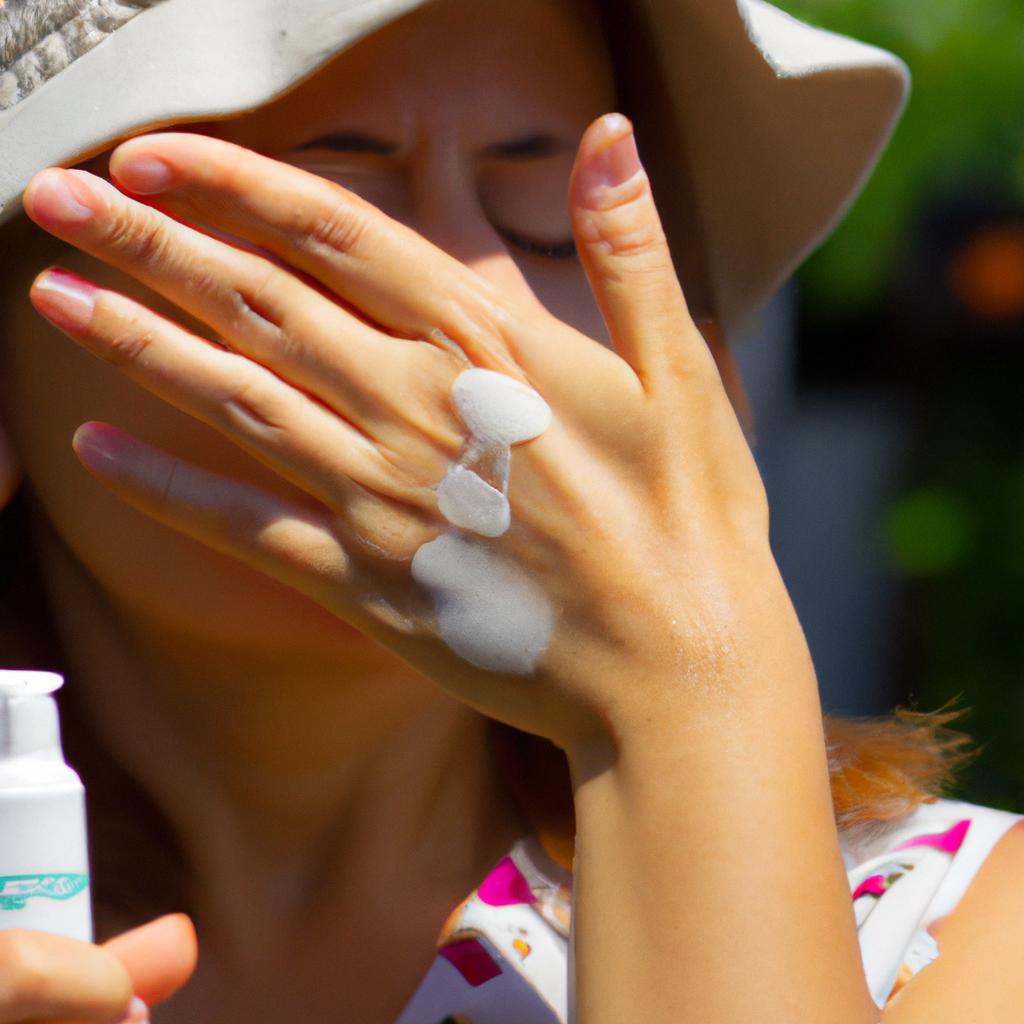As the summer months approach, many people are wondering whether they can use body sunscreen on their face. While it may seem like a convenient solution to use just one product for both your face and body, it’s important to understand the differences between the two and the potential risks and benefits of doing so.
Introduction

Sunscreen is a vital component of any skincare routine, protecting your skin from harmful UV rays that can cause sunburn, premature aging, and even skin cancer. However, with so many different types of sunscreen available, it can be overwhelming to know which products to use and where to use them.
In this article, we’ll explore whether it’s safe to use body sunscreen on your face, the differences between facial and body skin, and the best practices for sun protection that can help keep your skin healthy and glowing all year round.
Importance of Using Sunscreen

Sunscreen is an essential part of any skincare routine, regardless of your skin type or the time of year. The sun’s UV rays can cause damage to your skin even on cloudy days, and prolonged exposure can increase your risk of skin cancer.
Regular use of sunscreen not only protects your skin from these harmful rays but can also help prevent premature aging, sunspots, and other skin damage. So, whether you’re spending a day at the beach or just running errands around town, it’s important to apply sunscreen to any exposed skin, including your face.
Understanding Sunscreen
When it comes to sunscreen, there are two main types: chemical and physical. Chemical sunscreen contains ingredients that absorb UV rays, while physical sunscreen creates a barrier on the skin that reflects the rays. Both types of sunscreen can be found in both body and facial products, but there are some differences to keep in mind.
Types of Sunscreen
Chemical sunscreen is the most common type and is often found in spray or lotion form. It can be absorbed quickly into the skin and is often easier to apply to large areas of the body. Physical sunscreen, on the other hand, is often thicker and more difficult to apply but can provide more comprehensive protection.
Differences Between Body Sunscreen and Facial Sunscreen
Facial skin is generally more sensitive and prone to breakouts than body skin, so facial sunscreen is often formulated to be lighter and less greasy. It may also contain additional ingredients like antioxidants or moisturizers to help nourish the skin. Body sunscreen, on the other hand, is often thicker and more water-resistant, making it better suited for outdoor activities.
When choosing a sunscreen product, it’s important to consider your skin type and the level of sun exposure you’ll be experiencing. While body sunscreen can be used on the face in a pinch, it’s generally recommended to use a sunscreen specifically formulated for facial use to ensure optimal protection and avoid potential irritation or breakouts.
Can I Use Body Sunscreen on My Face?
When it comes to using body sunscreen on your face, there are both pros and cons to consider. While it may seem like a convenient solution, especially if you’re traveling or on the go, it’s important to understand the risks and benefits of using body sunscreen on your face.
Pros of Using Body Sunscreen on Your Face
- Convenience: Using one product for both your face and body can be a time-saver, especially if you’re in a hurry or on the go.
- Availability: In some cases, body sunscreen may be more readily available or affordable than facial sunscreen.
- Coverage: Body sunscreen can provide broad-spectrum protection and may be more resistant to water and sweat than facial sunscreen.
Cons of Using Body Sunscreen on Your Face
- Skin Irritation: Body sunscreens may contain ingredients that can irritate the more sensitive skin on your face, causing redness, itching, or breakouts.
- Clogged Pores: Using body sunscreen on your face can also clog pores, leading to acne and other skin blemishes.
- Inadequate Protection: Body sunscreen may not provide the same level of protection as facial sunscreen, particularly for the delicate skin on your face.
Risks and Benefits
Ultimately, the decision to use body sunscreen on your face depends on your individual skin type and needs. While it may be a convenient option in some cases, it’s important to weigh the potential risks and benefits carefully.
If you have sensitive skin or are prone to acne breakouts, it’s generally best to use a facial sunscreen specifically designed for the delicate skin on your face. However, if you’re in a pinch and don’t have access to facial sunscreen, using body sunscreen is better than no protection at all.
Best Sunscreen for the Face
When it comes to choosing a sunscreen for your face, there are several factors to consider, including your skin type, the level of sun exposure you’ll be experiencing, and any specific skin concerns you may have. Here are some key factors to keep in mind when selecting a facial sunscreen:
Factors to Consider When Choosing Sunscreen for the Face
SPF Level
The SPF (Sun Protection Factor) level of your sunscreen is a crucial factor to consider when choosing a product for your face. The American Academy of Dermatology recommends using a sunscreen with an SPF of at least 30, which can help protect against up to 97% of the sun’s harmful UVB rays.
Type of Sunscreen
There are two main types of sunscreen: physical and chemical. Physical sunscreens, also known as mineral sunscreens, contain natural ingredients such as titanium dioxide and zinc oxide and work by reflecting UV rays away from the skin. Chemical sunscreens, on the other hand, contain synthetic ingredients that absorb UV radiation and convert it into heat. When selecting a sunscreen for your face, it’s essential to choose a formula that suits your skin type and provides adequate protection.
Skin Type
Your skin type can also play a significant role in selecting the best sunscreen for your face. If you have oily or acne-prone skin, for example, you may want to opt for a lightweight, oil-free formula that won’t clog your pores. If you have dry or sensitive skin, a moisturizing sunscreen with added antioxidants can help keep your skin hydrated and protected.
Recommended Sunscreen Brands for Facial Use
When it comes to choosing a facial sunscreen, there are several high-quality brands to consider. Here are some top recommendations:
EltaMD UV Clear Facial Sunscreen
This lightweight, oil-free formula is perfect for oily or acne-prone skin. It contains niacinamide and hyaluronic acid to help improve skin texture and hydration.
La Roche-Posay Anthelios Ultra-Light Mineral Sunscreen Fluid
This mineral sunscreen is a great choice for those with sensitive skin. It contains antioxidants to help protect against free radical damage and is water-resistant for up to 80 minutes.
Supergoop! Unseen Sunscreen
This weightless, scentless formula is ideal for all skin types. It contains red algae to help protect against blue light from electronic devices and is also reef-safe.
Conclusion
In conclusion, while it may seem convenient to use body sunscreen on your face, it’s important to understand the differences between facial and body skin and the potential risks and benefits of doing so. Facial skin is thinner and more delicate than body skin, making it more susceptible to irritation and breakouts.
When it comes to sunscreen for the face, there are a few factors you should consider, including your skin type, the SPF level, and the type of sunscreen that works best for your skin. Look for products that are specifically designed for facial use and offer broad-spectrum protection against UVA and UVB rays.
At Sunscreen FAQ, we believe that sun protection is essential for maintaining healthy, youthful-looking skin. That’s why we offer a wide range of high-quality sunscreen products that are designed to meet the needs of all skin types. Whether you’re looking for a lightweight, oil-free formula for everyday use or a water-resistant sunscreen for outdoor activities, we’ve got you covered.
Remember, no matter what type of sunscreen you choose, it’s important to use it regularly and apply it generously to all exposed skin. With the right sun protection, you can enjoy all the benefits of the great outdoors while keeping your skin looking and feeling its best.




